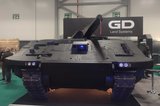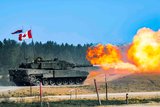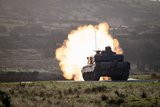NRL developing transparent armour
The US Naval Research Laboratory (NRL) is working on a new transparent thermoplastic elastomer armour that is lighter than bullet-resistant glass while maintaining superior ballistic properties.
The armour is also field-repairable thanks to the material's solidification properties. It uses soft, rubbery polymers called thermoplastic elastomers that are converted by physical means, rather than a chemical process, to a solid. As this is a reversible process, it enables damaged armour surfaces to be repaired 'on the fly' in the field.
The NRL has previously tested the use of polymeric materials as a coating to achieve improved impact resistance of hard substrates. Applying polyurea and polyisobutylene layers enhances the ballistic performance of armour and helmets, and achieves greater ballistic effectiveness and mitigation of blast waves.
By using a variation of employing thermoplastic elastomers, the NRL has been able to recreate superior ballistic properties of polyurea and polyisobutylene coatings, with the added benefit of the material being transparent, lighter than conventional bullet-resistant glass, and repairable.
Mike Roland, senior scientist, NRL Soft Matter Physics, said: 'Heating the material above the softening point - around 100 degrees Celsius - melts the small crystallites, enabling the fracture surfaces to melt together and reform via diffusion. This can be accomplished with a hot plate, akin to an iron, that moulds the newly-forming surface into a smooth, flat sheet with negligible effect on integrity.
'Because of the dissipative properties of the elastomer, the damage due to a projectile strike is limited to the impact locus. This means that the [effect] on visibility is almost inconsequential, and multi-hit protection is achieved.'
More from Land Warfare
-
![US DoD task force’s DroneHunter acquisition lays groundwork for Replicator 2 CUAS strategy]()
US DoD task force’s DroneHunter acquisition lays groundwork for Replicator 2 CUAS strategy
As the US Department of Defense looks to counter the growing threat of uncrewed aerial systems to improve homeland security, the DroneHunter acquisition could point to future commercial innovation.
-
![Norway opts for Hanwha’s Chunmoo for long-range fires under $2 billion deal]()
Norway opts for Hanwha’s Chunmoo for long-range fires under $2 billion deal
The selection of Hanwha’s K239 Chunmoo long-range precision fires system, with a contract expected to be signed on 30 January, makes Norway the second European country to choose the system. It is expected an operational system will be in service within four years.
-
![Layered protection: How air defence is adapting to rising drone and missile threats (podcast)]()
Layered protection: How air defence is adapting to rising drone and missile threats (podcast)
A surge in aerial threats – from advanced missiles to low-cost drones – is reshaping the way militaries approach air defence, driving demand for flexible, multi-layered solutions.






















